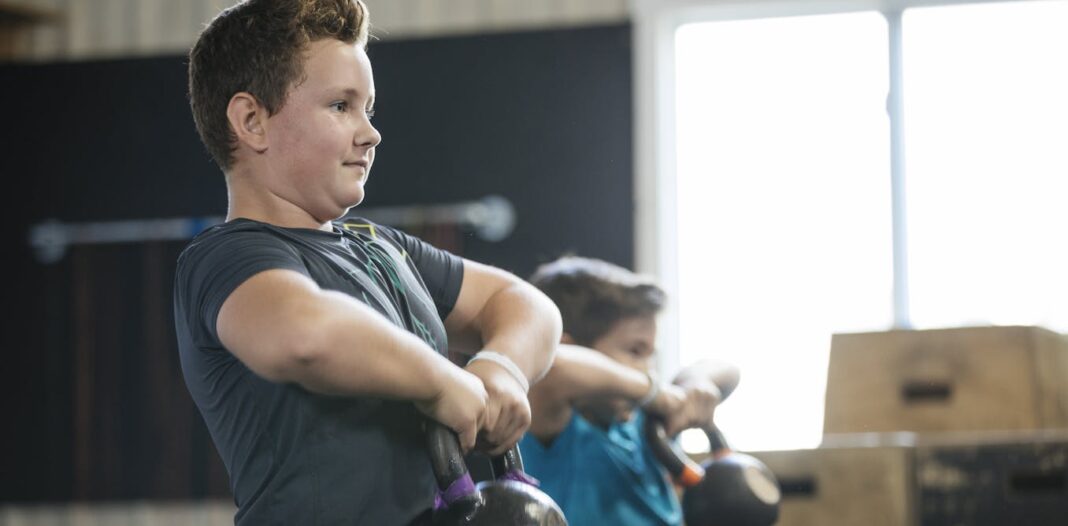Safety First
The question I receive most often, for good reason, is whether strength training is safe for youth. In a study examining injury rates in numerous sports, researchers found that, when done correctly, strength training had a lower risk of injury than nearly all other sports. This is not only true for adults but also for children.
That being said, it is important to consider a young person’s emotional maturity before handing them a dumbbell. During my career, I have designed and implemented strength training programs for kids of all ages, even as young as 6 years old. But not every child in that age range is ready for strength training. For their own safety, participants need to be emotionally mature enough to listen to and follow instructions so that they don’t hurt themselves. For some kids, that’s as early as age 6, while others may not be ready until they are a few years older.
Because correct technique is key to doing these exercises safely, it is important that strength training programs for children be designed and implemented under the guidance of a qualified trainer or coach. This means someone with valid credentials and who has received higher education in exercise science.
The Benefits of Strength Training
Research has shown that stronger muscles in kids reduce the likelihood of injuries during various types of activities.
One study we conducted found that lower muscle strength and size could lead to lower performance during different activities kids typically engage in, such as running and jumping. Not only this, but kids with lower strength tend to have worse neuromuscular efficiency, which means that they are not as proficient at activating their muscles. This translates to using more energy and feeling more worn out when they’re physically active.
While it’s easy to see how strength training is important for youth who play sports, there are also incredible health benefits for kids who may not be into organized sports. Studies have shown the positive effect that strength training can have on healthy bone development in kids, leading to a lower likelihood of fractures. Research has also shown that strength training in kids can have a positive influence on psychological well-being and academic performance.
Creating an Age-Appropriate Program
An effective strength training program starts with setting age-appropriate expectations.
Children and adolescents are not miniature adults, and not all young people will adapt to a strength training program the same way. For instance, research shows that during puberty, there are unique differences in how muscle develops in boys versus girls.
Specifically, girls may have more neuroplasticity, which is defined as the brain’s ability to recognize new movements and patterns. This means that they may adapt to more complex movements faster than boys, while boys will see more significant changes when their muscle mass starts increasing with puberty. This doesn’t necessarily mean that girls and boys need vastly different strength training programs. It simply means not all kids will have the same rate of progression for certain exercises.
Taking that into consideration, an age-appropriate program should focus on technique over results. How much weight a child can lift is far less important than teaching them good movement patterns. For example, if a child is having difficulty performing normal pushups, a qualified professional could modify the exercise so they start with wall pushups or incline pushups. This will help that child build good movement patterns and be better for their strength in the long run.
Focusing on the Long Term
Obviously, most kids won’t grow up to be professional athletes, but every child can develop athleticism. A good strength training program for kids will set them on a trajectory to a healthy lifestyle from childhood to adolescence to adulthood.
Research shows that beginning exercise in childhood tends to lead to continued exercise habits in adulthood. For this reason, the National Strength and Conditioning Association has encouraged a focus on improving training habits in childhood that can then be maintained into adulthood for overall better health and well-being.
Conclusion
Strength training is not only safe for kids, but it also has numerous benefits for their physical and mental health. By starting young with an age-appropriate strength training program, kids can develop good movement patterns and incorporate exercise into their routine, which can have lasting benefits for their health into adulthood.
FAQs
Q: What is the ideal age for kids to start strength training?
A: The ideal age for kids to start strength training depends on their emotional maturity and ability to follow instructions. Some kids may be ready as early as age 6, while others may not be ready until they are a few years older.
Q: How do I know if a strength training program is appropriate for my child?
A: Look for a program designed and implemented by a qualified trainer or coach with valid credentials and higher education in exercise science. Ensure the program focuses on technique over results and is age-appropriate.
Q: What are the benefits of strength training for kids?
A: Strength training can help improve sports performance, reduce the risk of injuries, promote healthy bone development, and have a positive influence on psychological well-being and academic performance.
Q: Can strength training help kids with obesity?
A: Yes, resistance training interventions in youth with obesity have shown to have positive impacts on metabolic health, body composition, psychological health, and overall quality of life.




